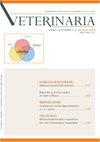半集约化系统犊牛呼吸道病毒的血清学研究及其与呼吸道症状学的关系
Q4 Veterinary
引用次数: 0
摘要
呼吸系统疾病发病率高、死亡率高,是严重的健康问题,造成巨大的经济损失。本研究的目的是测定与牛支气管肺炎相关的主要病毒病原(牛病毒性腹泻病毒、牛疱疹病毒1型和牛呼吸道合胞病毒)的抗体频率,寻找这些病原体与所观察到的临床症状之间的联系。我们研究了来自巴西圣保罗两个兽群的63头小牛。体检后将犊牛分为健康犊牛和呼吸道疾病犊牛。获得血清,随后用病毒中和法检测抗体。研究了临床症状与血清学结果之间的关系。牛病毒性腹泻病毒抗体阳性率为57.10%,牛1型疱疹病毒抗体阳性率为66.70%,牛呼吸道合胞病毒抗体阳性率为93.70%。牛病毒性腹泻病毒抗体在有浆液/粘液鼻分泌物的动物中出现的频率较高(P = 0.01)。脱水动物(P = 0.008)和直肠温度高于39.5℃的动物(P = 0.03)出现牛呼吸道合胞病毒抗体的频率较高。本研究的结果优于在系统广泛的农场进行的研究,证实了管理在微生物传播中的重要性。本文章由计算机程序翻译,如有差异,请以英文原文为准。
Estudio serológico frente a los virus respiratorios en terneros en un sistema semi-intensivo y su relación con la sintomatología respiratoria
Respiratory diseases are a major health problem due to the high morbidity and mortality rates, with great economic losses. The aim of this study was to determine the frequency of antibodies against the main viral etiological agents related to bronchopneumonia in cattle (bovine viral diarrhea virus, bovine herpesvirus type-1 and bovine respiratory syncytial virus), searching for associations between these agents and the clinical signs observed. We studied 63 calves from two herds from Sao Paulo, Brazil. After physical examination, the calves were divided into healthy calves and calves with respiratory disease. Serum was obtained for subsequent detection of antibodies by viral neutralization. The association between clinical signs and serological findings was studied. Antibodies against bovine viral diarrhea virus, bovine herpesvirus type-1 and bovine respiratory syncytial virus were detected in 57.10%, 66.70% and 93.70% of the samples. A higher frequency of antibodies against bovine viral diarrhea virus was observed in animals with serous / mucous nasal discharge (P = 0.01). The dehydrated animals (P = 0.008) and those with a rectal temperature above 39.5 oC (P = 0.03) presented a higher frequency of antibodies against the bovine respiratory syncytial virus. The present work presented results superior to those found in studies in farms with extensive system, confirming the importance of management in the transmission of microorganisms.
求助全文
通过发布文献求助,成功后即可免费获取论文全文。
去求助
来源期刊

Veterinaria
农林科学-兽医学
CiteScore
0.10
自引率
0.00%
发文量
21
审稿时长
>12 weeks
期刊介绍:
VETERINARIA is the official scientific journal of the Italian Companion Animal Veterinary Association (SCIVAC) and is published bimonthly by Edizioni Veterinarie (E.V.). Its aim is to promote the spread and development of new ideas and techniques in the field of clinical and veterinary practices, with the ultimate goal of improving and promoting the continuing education of veterinary practicioners. VETERINARIA publishes literature reviews, original articles, diagnostic corners and clinical cases on different topics related to medicine and surgery of the dog, cat and of other companion animals, as well as short communications from congresses.
 求助内容:
求助内容: 应助结果提醒方式:
应助结果提醒方式:


